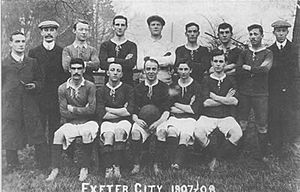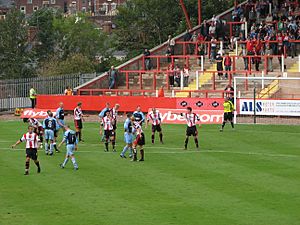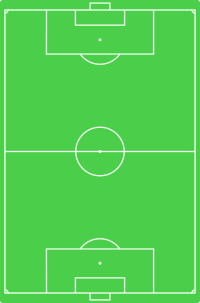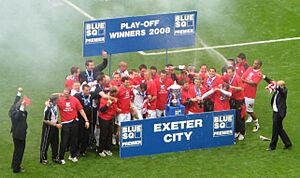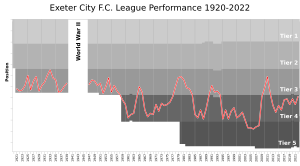Exeter City F.C. facts for kids
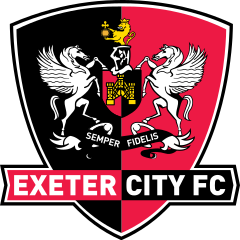 |
||||
| Full name | Exeter City Football Club | |||
|---|---|---|---|---|
| Nickname(s) | The Grecians | |||
| Founded | 1904 | |||
| Ground | St James Park | |||
| Capacity | 8,720 | |||
| Owner | Exeter City Supporters' Trust | |||
| Chairman | Clive Harrison (interim) | |||
| Manager | Gary Caldwell | |||
| League | League Two | |||
| 2018–19 | League Two, 9th of 24 | |||
|
||||
Exeter City Football Club is a professional football team from Exeter, England. The team is often called "the Grecians." They play in League Two, which is the third highest level of football in England. What's cool about Exeter City is that it's owned by its fans through the Exeter City Supporters' Trust.
The club started in 1901 and has always played its games at St James Park. In 1914, Exeter City made history by being the first club to play against the national team of Brazil during a tour of South America. Because of this, Exeter City and the Brazilian club Fluminense are now partner clubs. Exeter City joined the Football League in 1920. They have had many ups and downs, including winning their first league title in 1990. After a few tough years, they were promoted back to League One in 2022.
Contents
History of Exeter City
How the Club Started
Exeter City F.C. was formed in 1904 when two local clubs, Exeter United F.C. and St Sidwell's United, decided to join forces. The new team was named Exeter City. They continued to play at Exeter United's home ground, St James Park, which is still their home today.
On September 10, 1904, Exeter City played its first official match. They won 2–1 against the 110th Battery of the Royal Artillery. About 600 people watched the game. The team did very well in their first season, winning the East Devon League. In 1908, Exeter City became a professional club. This meant players were paid to play. They then joined the Southern League.
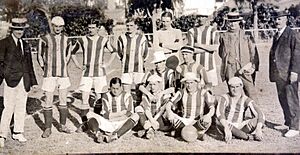
On October 3, 1908, City had a huge win in the FA Cup, beating Weymouth 14–0. Ten of those goals were scored in the first half! In 1910, the team changed its colours to red and white. Before that, they wore green and white, which they thought was unlucky. The new colours brought better luck, and they've worn red and white ever since.
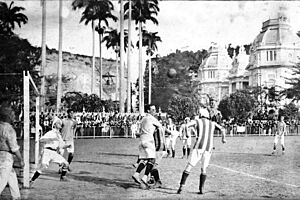
In 1914, Exeter City went on a special tour to South America. They played eight matches in Argentina and Brazil. The most famous game was on July 21, 1914, against the first-ever Brazil national football team. Brazil won that match 2–0. This tour helped football become more popular in South America. In 1920, Exeter City was invited to be one of the founding teams of the Football League Third Division.
Playing in the Football League (1920–2003)
Exeter City's first Football League match was on August 28, 1920, against Brentford. Exeter won 3–0. The League was later split into northern and southern sections, and City joined the Third Division South. In 1931, City had a great run in the FA Cup, reaching the sixth round. They lost to Sunderland in front of their biggest home crowd ever. Fifty years later, they reached the sixth round again.
In the 1932–33 season, they finished second in their division. This was their highest league position ever. In 1964, City earned their first promotion to the Third Division. However, they were relegated two seasons later. They were promoted again in 1977 and stayed in the Third Division for seven seasons.
In 1990, Exeter City won their first major trophy, becoming champions of the Fourth Division. This was a big achievement for the club. After this success, the team struggled and was relegated in 1994. In 2003, after nearly a decade of difficulties, Exeter City lost its place in the Football League and moved down to the Conference National.
The Conference Years (2003–2008)
After being relegated in 2003, the club was taken over by the Exeter City Supporters' Trust. This meant the fans owned the club! The Trust worked hard to keep the club going, raising money and dealing with financial challenges.
A big boost came in 2005 when Exeter City played Manchester United in the FA Cup. They drew 0–0 at Old Trafford, which brought in a lot of money for the club. This helped them pay off their debts.
In the 2006–07 season, Exeter City reached the play-offs but lost in the final at Wembley Stadium. However, they didn't give up! The very next season, in 2008, they reached the play-off final again. This time, they won 1–0 against Cambridge United, earning promotion back to the Football League!
Back in the Football League (2008–Present)
Exeter City continued their success by finishing second in League Two in 2009. This meant they were promoted to League One! They stayed in League One for three seasons.
In August 2010, the club faced a sad time when their striker, Adam Stansfield, passed away from cancer at age 31. The club honored him by retiring his number 9 shirt for nine seasons. Now, only players from the club's own youth academy can wear the number 9 shirt. In 2022, Adam's son, Jay Stansfield, even returned to Exeter City and wore the number 9 shirt, following in his father's footsteps.
After being relegated back to League Two in 2012, Exeter City continued to work hard. In 2014, the club went on another tour to Brazil to celebrate 100 years since their first historic tour. They played against Fluminense's Under 23 team and other local clubs.
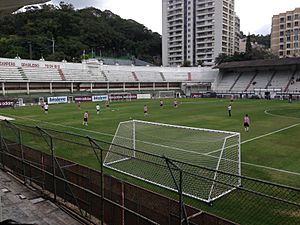
In the 2016–17 season, Exeter City had a great comeback. They started at the bottom of the league but finished fifth, earning a play-off spot. They reached the final at Wembley but lost 2–1 to Blackpool. The next season, 2017–18, they reached the play-off final again but lost to Coventry.
On April 26, 2022, Exeter City finally achieved automatic promotion to League One after a 2–1 win against Barrow. They finished the 2021–22 season in second place in League Two.
What is the Nickname "The Grecians"?
The club is nicknamed The Grecians, and no one is completely sure why! One idea is that people living in the St Sidwells area of Exeter were historically called "Greeks" or "Grecians." This might be because their area was outside the old city walls, like how the Greeks attacked the walls of Troy in ancient stories. Another idea is that it came from a children's group in St Sidwells called the 'Greasy Un's'. There's also a theory that it came from a jeweler's shop near the ground that had 'Grecians' on its clock.
Fans and Rivalries
Famous Fans
Exeter City has some famous fans! These include Coldplay frontman Chris Martin, actor Adrian Edmondson, and TV presenter Noel Edmonds. Singer Joss Stone even joined the supporters' trust. In 2002, pop superstar Michael Jackson was made an honorary director of the club! He visited St James Park with his friend Uri Geller, who was also a director.
Rival Teams
Exeter City's biggest rival is Plymouth Argyle. Their games are known as Devon derbies. These two teams have played each other many times throughout history. Exeter City also has a friendly rivalry with Torquay United. These clubs are closer geographically and have played each other more often. Even though they are rivals on the field, these clubs have helped each other out during tough financial times.
Players
Current Squad
|
|
Academy
Exeter City has a strong youth academy that helps young players develop their skills.
Retired Numbers
As mentioned, the number 9 shirt was retired for nine seasons after Adam Stansfield's death. Now, it's worn only by players who come through the club's own academy.
Notable Former Players
Many talented players have played for Exeter City. Some went on to play for bigger clubs or even their national teams. These include Cliff Bastin, who played for Arsenal and England, and Maurice Setters, who won the FA Cup with Manchester United. Goalkeeper Dick Pym was sold to Bolton Wanderers in 1921 for £5,000, which helped Exeter City buy St. James Park.
More recently, players like Dean Moxey, George Friend, Matt Grimes, Ethan Ampadu, and Ollie Watkins have come through Exeter City's academy and gone on to play in the Premier League. Ethan Ampadu has also played for the Wales national team, and Ollie Watkins has played for the England national team.
Hall of Fame
In 2014, Exeter City started a Hall of Fame to celebrate its "genuine legends." These are players who made a huge impact on the club.
| Inducted | Name | Nationality | Position | Playing career | League | Ref | |
|---|---|---|---|---|---|---|---|
| Apps | Goals | ||||||
| 2014 | Alan Banks | FW | 1963–66, 1967–73 | 258 | 101 | ||
| Cliff Bastin | FW | 1928–29 | 17 | 6 | |||
| Reg Clarke | MF | 1927–37 | 315 | 18 | |||
| Dermot Curtis | FW | 1963–66, 1967–69 | 157 | 33 | |||
| Jimmy Giles | DF | 1971–75, 1977–81 | 313 | 13 | |||
| Tony Kellow | FW | 1976–78, 1980–84, 1985–88 | 332 | 129 | |||
| Arnold Mitchell | MF | 1952–66 | 495 | 44 | |||
| Dick Pym | GK | 1911–21 | 203 | 0 | |||
| 2017 | Peter Hatch | DF | 1973–82 | 346 | 18 | ||
| Graham Rees | FW | 1954–66 | 345 | 85 | |||
| Adam Stansfield | FW | 2006–10 | 158 | 39 | |||
| Sid Thomas | FW | 1904–08 | 38 | 16 | |||
Club Leadership
Coaching Staff
| Position | Name |
|---|---|
| Manager | |
| Assistant Manager | |
| First-Team Coach/Under 23-Coach | |
| Goalkeeping Coach | |
| Player Development Phase Coach | |
| Head of Strength and Conditioning | |
| Strength and Conditioning Coach | |
| Head of Performance Analysis | |
| First-Team Analyst | |
| First-Team Analyst | |
| Head of Performance and Wellbeing | |
| Club Secretary | |
| Club Doctor | |
| Head Physiotherapist | |
| Sports Therapist | |
| Kit Room Lead | |
| Matchday Kit Co-Ordinator | |
| Technical Director | |
| Chief Scout |
Manager History
| Name | From | Until | Played | Won | Drawn | Lost | Win % | Honours / Notes |
|---|---|---|---|---|---|---|---|---|
| Unknown | 1904 | 1908 | — | — | — | — | — | |
| April 1, 1908 | December 31, 1922 | 113 | 31 | 32 | 50 | 27.43% | ||
| January 1, 1923 | November 1, 1927 | 209 | 76 | 41 | 92 | 36.36% | ||
| March 1, 1928 | February 1, 1929 | 42 | 11 | 10 | 21 | 26.19% | ||
| February 1, 1929 | September 30, 1935 | 295 | 117 | 66 | 112 | 39.66% | ||
| October 1, 1935 | May 31, 1939 | 168 | 48 | 48 | 72 | 28.57% | ||
| August 1, 1945 | March 1, 1952 | 270 | 99 | 55 | 116 | 36.67% | ||
| March 1, 1952 | March 31, 1953 | 52 | 14 | 16 | 22 | 26.92% | ||
| 1953 | 1953 | — | — | — | — | — | ||
| April 1, 1953 | April 30, 1957 | 199 | 62 | 50 | 87 | 31.16% | ||
| May 1, 1957 | January 1, 1958 | 28 | 7 | 5 | 16 | 25% | ||
| January 1, 1958 | May 31, 1960 | 116 | 48 | 26 | 42 | 41.38% | ||
| June 1, 1960 | April 30, 1962 | 97 | 27 | 24 | 46 | 27.84% | ||
| May 1, 1962 | February 1, 1963 | 28 | 7 | 4 | 17 | 25% | ||
| February 1, 1963 | January 31, 1965 | 102 | 41 | 33 | 28 | 40.19% | ||
| February 1, 1965 | June 1, 1966 | 66 | 16 | 19 | 31 | 24.24% | ||
| June 1, 1966 | April 30, 1967 | 50 | 15 | 16 | 19 | 30% | ||
| May 1, 1967 | February 1, 1969 | 91 | 23 | 31 | 37 | 25.27% | Second time as manager | |
| April 1, 1969 | December 21, 1976 | 377 | 138 | 98 | 141 | 36.6% | ||
| January 1, 1977 | January 5, 1979 | 109 | 45 | 33 | 31 | 41.28% | ||
| January 1, 1979 | June 1, 1983 | 240 | 88 | 57 | 95 | 36.67% | ||
| July 20, 1983 | May 14, 1984 | 50 | 6 | 16 | 28 | 12% | ||
| June 7, 1984 | April 30, 1985 | 47 | 13 | 14 | 20 | 27.66% | ||
| May 1, 1985 | December 11, 1987 | 128 | 35 | 46 | 47 | 27.34% | ||
| December 11, 1987 | May 8, 1988 | 27 | 4 | 9 | 14 | 14.81% | ||
| May 9, 1988 | August 1, 1991 | 157 | 67 | 26 | 64 | 42.68% | Fourth Division Champions: 1989–90 | |
| August 6, 1991 | January 20, 1994 | 135 | 36 | 43 | 56 | 26.67% | ||
| January 24, 1994 | July 31, 1995 | 69 | 14 | 16 | 39 | 20.29% | Second time as manager | |
| August 1, 1995 | January 9, 2000 | 235 | 69 | 70 | 96 | 29.36% | ||
| January 10, 2000 | September 24, 2001 | 86 | 20 | 24 | 42 | 23.26% | ||
| September 24, 2001 | October 6, 2002 | 54 | 17 | 14 | 23 | 31.48% | ||
| October 6, 2002 | October 17, 2002 | 1 | 0 | 1 | 0 | 0% | Caretaker Manager | |
| October 17, 2002 | February 25, 2003 | 26 | 6 | 8 | 12 | 23.08% | ||
| February 25, 2003 | May 24, 2003 | 13 | 5 | 5 | 3 | 38.46% | ||
| June 9, 2003 | October 7, 2004 | 62 | 26 | 19 | 17 | 41.94% | ||
| October 7, 2004 | October 18, 2004 | 2 | 0 | 2 | 0 | 0% | Joint Caretaker Managers | |
| October 18, 2004 | June 25, 2006 | 89 | 44 | 16 | 29 | 49.44% | FA Trophy Semi-finalists: 2005–06 | |
| June 26, 2006 | June 1, 2018 | 626 | 241 | 159 | 226 | 38.50% | Conference National Play-off Finalists: 2006–07 Conference National Play-off Winners: 2007–08 League Two Runners-up: 2008–09 League Two Manager of the Year: 2009 Football League Trophy Area Finalists: 2010–11 League Two Play-off Finalists: 2016–17, 2017–18 |
|
| June 1, 2018 | October 4, 2022 | 227 | 100 | 67 | 60 | 44.05% | League Two Play-off Finalists: 2019–20 League Two Runners-up: 2021–22 |
|
| October 4, 2022 | October 24, 2022 | 6 | 3 | 0 | 3 | 50% | Joint Caretaker Managers | |
| October 24, 2022 | Present | 142 | 51 | 32 | 59 | 35.92% | Current manager |
Club Achievements
Trophies Won
League
- Fourth Division / League Two (level 4)
- Champions: 1989–90
- Runners-up: 1976–77, 2008–09, 2021–22
- Promoted: 1963–64
- Conference (level 5)
- Play-off winners: 2008
Cup
- Third Division South Cup
- Winners: 1933–34
- Devon St. Luke's Challenge Cup
- Winners (22 times): 1925–26, 1926–27, 1927–28, 1953–54, 1958–59, 1960–61, 1961–62, 1962–63, 1963–64, 1964–65, 1967–68, 1973–74, 1984–85, 1985–86, 1986–87, 1996–97, 1997–98, 2001–02, 2003–04, 2004–05, 2008–09, 2018–19.
- East Devon Senior Cup
- Winners: 1953–54, 1980–81, 1981–82
- Trowbridge Charity Cup
- Winners: 1927–28
- Hospital Cup
- Winners: 1969–70
- Bill Slee Cup
- Winners: 1985–86
- Brian Lomax Supporters Direct Cup
- Winners: 2017–18
Club Records
- Largest league victory: 8–1 vs. Coventry City (1926) and 8–1 vs. Aldershot (1935).
- Largest FA Cup victory: 14–0 vs. Weymouth (1908).
- Largest combined score in a match: 11–6 vs Crystal Palace (1933–34).
- Largest league defeat: 0–9 vs. Notts County (1948) and 0–9 vs. Northampton Town (1958).
- Record home attendance: 20,984 vs. Sunderland (FA Cup, 1931).
- Record away attendance: 67,551 vs. Manchester United at Old Trafford (FA Cup, 2005).
- Most away wins in a single league season: 13 wins (from 23 matches) in 2016–17.
- Furthest in the FA Cup: Quarter-finals in 1930–31 and 1980–81.
- Highest ever league position: Runners-up in the Third Division South (Tier 3) in 1932–33.
Images for kids
-
Edgar Vincent, 1st Viscount D'Abernon, a former chairman of the club.
See also
 In Spanish: Exeter City Football Club para niños
In Spanish: Exeter City Football Club para niños
- Exeter City Supporters' Trust
- Exeter City Women F.C.
- List of fan-owned sports teams


